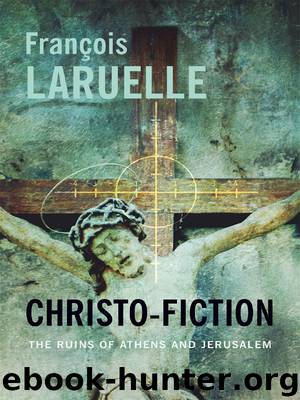Christo-Fiction by François Laruelle

Author:François Laruelle
Language: eng
Format: epub
Tags: PHI027000, Philosophy/Movements/Deconstruction, REL067000, Religion/Christian Theology/General
Publisher: Columbia University Press
Published: 2015-04-27T16:00:00+00:00
THE INTERPRETATION OF MEANING AND THE MEANING OF INTERPRETATION
The rigorous interpretation of the words of Christ as the propositions of a science, or as the oraxioms belonging to such a science, is an experiment that requires a quasi-experimental “preparation”—like the preparation for the “sacrifice” on the Cross. A formula of Christ’s cannot be taken up like just any old discourse without being prepared, albeit under the general and “macroscopic” conditions of belief and theology. Such a formula is prepared, first of all, as a function of a certain device that enables the superposition of its interpretations or states, both Greek and Jewish, its only two possible contexts of reception and formulation. It is impossible to produce from the message of Christ and as a function of its local reception alone a meaning that is anything but blurred, suspended, or indeterminate and universal for all nations; this is what proselytism endeavors to do, all too happy to expand and protract Christ’s message. But what is at stake is the actualization of the promise or the messianity that the message contains, in the form of a probability amplitude to carry it out or fulfill it, to bring it to a probable form of presence.
We wrongly project, retrospectively, onto the generic Christ, or Christ-in-person, the measure that we take of him, when we should be thinking of him as indeterminate. Religions, especially those that have a founder, are supposed to be contingent or historical phenomena that take their meaning from a history that is appended to them. But the history of interpretations of Christ simply constitutes a reservoir of variables that enter into his state vector. The probability of his coming remains indeterminate; he shall come, but we know not where or when—for the Greeks, for the Jews, and for the cultural and mixed subjects that we are. Paul supposes a Christ-event that has already intervened, a resurrection that has already taken place, from which he builds a truth to declare, or that is declared like an event to be announced, as something that has already come and that shall come again. His problem is that of identifying himself with the Christ who is already dead-and-resurrected, and of living through the proxy of his representation, rather than living him through superposition in the matrix of the Cross. The whole theme of the “return” of Christ in each of his faithful is affected by this temporal determinism. If Christ is our contemporary, he is not so through a projection of the past onto the present, unless we want to make his contemporaneity a Greek reminiscence. The return can be neither from history nor into a history. It is an undercoming, a sub-venience, the “evolution” of a state vector in the direction of a cognizance of salvation, rather than a reconfirmation of ecclesio-centrism. Christian theology and its religion are something like an inversion of the real phenomena through consciousness and representation—a negation of the future, which is to say, of the authentic meaning of Christ.
Download
This site does not store any files on its server. We only index and link to content provided by other sites. Please contact the content providers to delete copyright contents if any and email us, we'll remove relevant links or contents immediately.
The Secret Power of Speaking God's Word by Joyce Meyer(3152)
Signature in the Cell: DNA and the Evidence for Intelligent Design by Stephen C. Meyer(3121)
Real Sex by Lauren F. Winner(3001)
The Holy Spirit by Billy Graham(2938)
The Gnostic Gospels by Pagels Elaine(2515)
Jesus by Paul Johnson(2348)
Devil, The by Almond Philip C(2322)
23:27 by H. L. Roberts(2241)
The Nativity by Geza Vermes(2220)
Chosen by God by R. C. Sproul(2155)
All Things New by John Eldredge(2149)
Angels of God: The Bible, the Church and the Heavenly Hosts by Mike Aquilina(1948)
The Return of the Gods by Erich von Daniken(1925)
Angels by Billy Graham(1915)
Knowing God by J.I. Packer(1844)
Jesus of Nazareth by Joseph Ratzinger(1797)
The Gnostic Gospel of St. Thomas by Tau Malachi(1779)
How To Be Born Again by Billy Graham(1775)
Evidence of the Afterlife by Jeffrey Long(1773)
